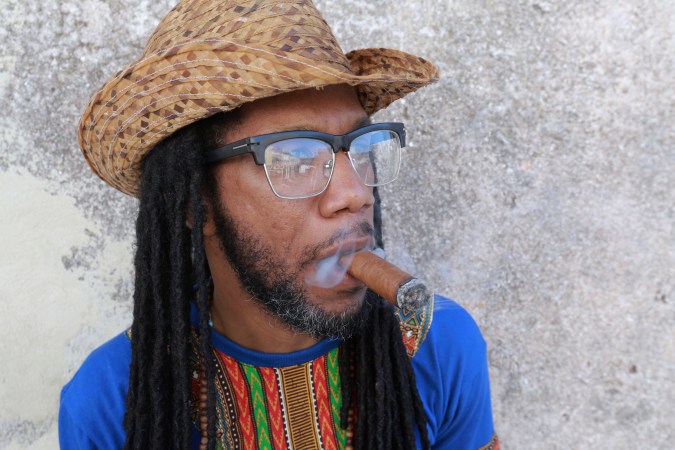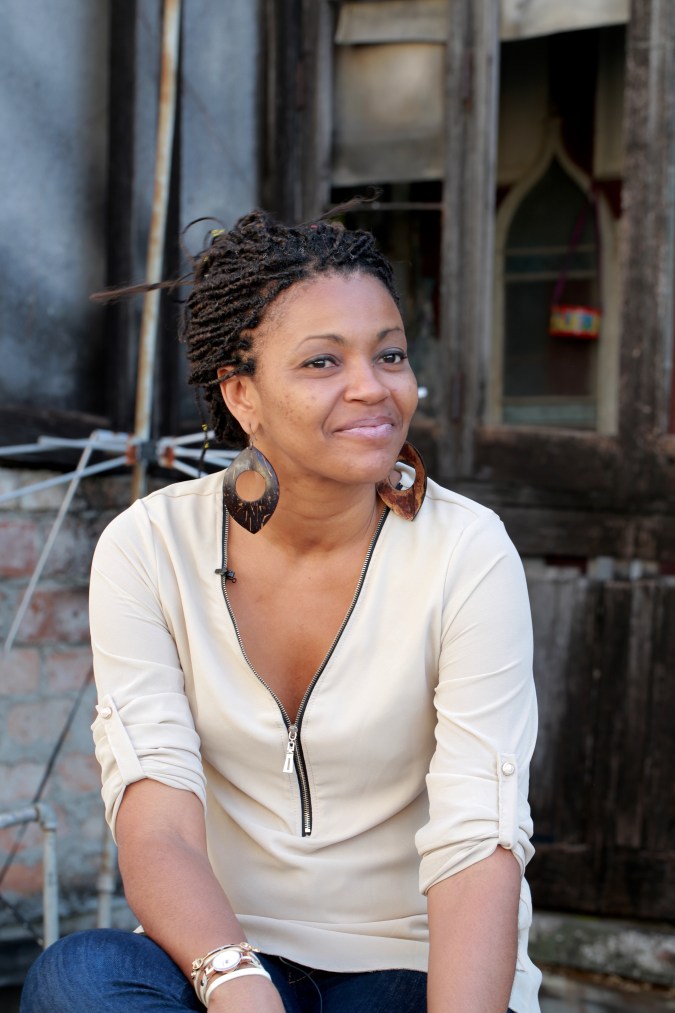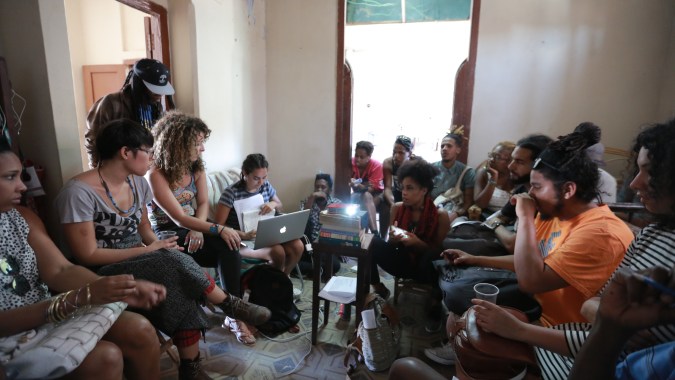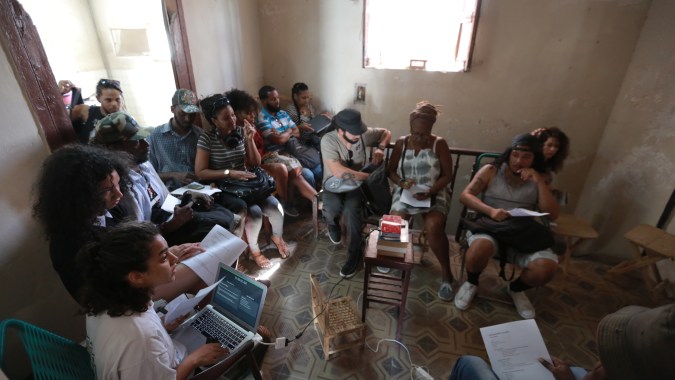In April, we were blessed with the compilation album AfroRazones, a 12-track archival rendering of Afro-Cuban resistance and a potent soundtrack of Black identity, visibility, and storytelling on the island. By recording 12 hip-hop, R&B, and spoken word artists, five producers, and five instrumentalists, the project illuminates a mindful curation that includes a range of voices and styles, as selected by Havana-based independent studio and record label owner DJ Jigüe and Executive Director Luna Olavarria Gallegos. While operating with a hip-hop-heavy custom sample bank, the multi-instrumentalist recording approach also lent space to graceful incorporation of Cuba-specific and transnational-rooted rhythms, like rumba, conga santiaguera, son, timba, and Afro-Latin jazz. The AfroRazones website describes the project as a “Cuban manifestation of Black resistance in 2017.”
Beyond the high-level quality of AfroRazones, however, is the importance of archiving the methods of collaboration, cultural production, and the discussions that emerged throughout the process of sharing knowledges in recording sessions and workshops. In this sense, AfroRazones offers a model example of representation and cultural exchange, but also of archiving the process of building bridges between Black resistance movements. In that way, we are armed not only, as the project has described, “with the wisdom of our ancestors,” but also with the music industry tools to support Afro-Cuban artists’ continued prosperity in the digital age.
For Olavarria Gallegos, the project blossomed out of ongoing investigations she’d been conducting on the island in collaboration with Norma Guillard, a notable Afro-Cuban academic who was key to the literacy campaign dedicated to making resources available for local Black women after the revolution. Throughout the process of archiving knowledges about how Black people see themselves in Cuba, Olavarria Gallegos was affirmed in the importance of making this information accessible, inspiring the concept compilation and multimedia project.
AfroRazones is a “Cuban manifestation of Black resistance in 2017.”
As the founder and owner of Guampara Studios and someone with indispensable ties to the local music community, DJ Jigüe joined the project as the Music Director, working closely with Olavarria Gallegos to curate the roster of featured musicians. This collaboration ensured an intentional process, not only guaranteeing that the voices included were gender-balanced and both emerging and veteran voices, but also encouraging a thematic focus. The artists were given topics to consider for their writing sessions, such as “identity, historical trauma, colorism, hair, and the importance of rap,” and the productions reflected a rapport between the “folkloric and the contemporary, so that every song has very powerful and tangible Cuban elements,” describes Olavarria Gallegos.
The adherence to these pillars in the production process is a testament to the artists’ enthusiasm for collaboration, and the deep historical connection communicated through studies of rhythm. Olavarria Gallegos identified percussionist El Menor as an example of this; he’s expressed the importance of his connection to Africa. According to Olavarria Gallegos, El Menor realized how “these patterns and rhythms came from the continent and what they meant to him as a survivor of slavery and that lineage. It was super important to him to continue telling that this is Cuban yes, but that it comes from somewhere.” As El Menor put it, through the collaborative process, he “learned how to introduce, in new ways, folkloric rhythms within hip-hop recordings, and the depth of this work…it’s a process of sharing, and it’s a conversation in all senses.”

AfroRazones showcases undeniable echoes of influence from Cuba’s robust academic and cultural exchange programs with African countries throughout the 70s, 80s, and 90s, as well as to African-American histories of resistance. Just as much as musical legacies can be traced to Africa, more recent manifestations also find their home in U.S.-bred hip-hop. Without them, a movement in Cuba wouldn’t exist.
El Individuo and El Prófugo’s single “Mi Raza” is a focal point of this connection and celebration of history, referencing the Black Panthers’ kinship with Cuba’s own Partido Independiente de Color, which was founded by Black veterans of the Cuban War of Independence and is comprised almost entirely of former slaves. As Olavarria Gallegos puts it, “Mi Raza,” which also references Malcolm X and Martin Luther King, “was El Individuo’s way of acknowledging that African-American history is just as important as African history to Cuba, because of the relationship that they have specifically with jazz and also with hip-hop.”

Just as hip-hop was born as a localized platform speaking power to injustice, the genre continues to exist as a means of sharing one’s truth – in this case, Afro-Cuban perspectives. As U.S.-based collaborator Edenized Perez describes, “It’s important to acknowledge the power hip-hop has in voicing out injustices and highlighting issues regarding race, gender, and class through the fifth pillar [of hip-hop], which KRS-One notes is knowledge; and these singers, musicians and poets do that perfectly through their words.” In this transference of knowledges, Perez notes the importance of local contexts. “Especially with hip-hop, one thing we emphasized was to start local, think global, in regards to how hip-hop, the genre, started. It was people from the Bronx talking about a lot of injustices that were going on, and touching base with their community and the people they were around.”
After the tracks were mixed and mastered, Olavarria Gallegos returned to Cuba in March, this time with collaborators and media professionals Nati Conrazon of conrazón, Edenized Perez, and Laura Catana, who was already based in Cuba and managing Guampara Studios. They offered a three-day workshop series that provided artists with resources around Internet media literacy, social media, and a history of the music industry and its transition into the digital era. At upwards of $3 per hour, Internet access is not only unreliable but also cost-prohibitive for many Cubans. As a result, the workshops acknowledged the reality that online platforms may not be a consistent resource, but having knowledge of options like SoundCloud, Instagram, and Facebook for self-promotion and distribution could be called upon to open up networks of collaboration and artistic growth.

The project is currently making the rounds on the island via the local distribution system el paquete, an informal network in which information is passed through the community on USBs. A necessarily subversive communication process, el paquete also creates the need for AfroRazones to manage two completely different modalities of publicity networks for promotion of the album.
Just as these dualities exist in the cultural production process, so too did they emerge in discussions, workshop-facilitated or not, of personal conceptions of Black identity and Black resistance. For Olavarria Gallegos, advocating for a “Cuban manifestation of Black resistance in 2017” also means understanding the specific context of the Afro-Cuban perspective, and being critical of the frameworks that dialogue initiates from. In saying Black Lives Matter, which originated in a United States context and conception of Blackness, for example, Olavarria Gallegos specifies that “we really have to question what we mean by that.”

In the context of collaborating with Afro-Cuban artists, Olavarria Gallegos emphasizes opportunities for growth in being actively curious and open to understanding where and how disparate perspectives exist. “Sometimes [it’s recognizing] they’re not going to bridge, and they’re not going to [converge] in a way that makes sense to all of us,” she explains. “Our ideas of Blackness are different; I identify as Black here, and in Cuba I’m white…When we talk about Blackness and resistance, perspectives and worlds are really, really different, and they clash all the time. And in order for us to resist together, that’s the first thing we need to do – to recognize that we have very, very different perspectives and that our worlds inform those perspectives.”
AfroRazones urges intentionality around the idea of cultural specificity, especially as visibility for discussions and writing about Afro-Latinidad surges. Olavarria Gallegos defines that mission as “being intentional about what we call ourselves, how we create connections, and how we identify and for what purposes.” As much as this is an individual process, it’s also one that sets an example for other Latinx cultural arenas, encouraging a more critical (and oftentimes, self-critical) take on broad concepts like mestizaje, Latinidad, racial myths, or the term Latinx itself, which often leave a dangerous amount of space for ambiguity and erasure.
AfroRazones is out now on Guampara Music.




